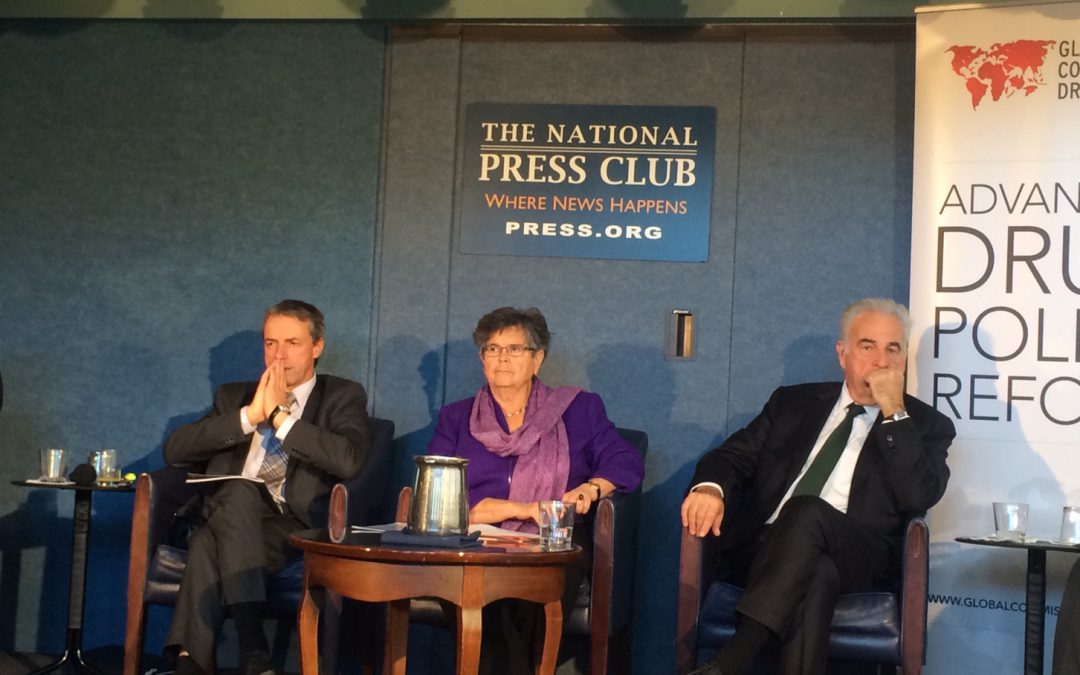WASHINGTON — Prohibition has failed as a remedy for the worldwide drug problem, and decriminalization with regulation remains as the best solution, according to a group of activists and former international leaders.
The Global Commission on Drug Policy released a report Monday, recommending decriminalization of drug use and possession. The commission, detailing its report at the National Press Club, consists of 25 leaders and activists from around the globe who advocate for drug policy reform.
Michel Kazatchkine, former head of the Global Fund to fight AIDS, Tuberculosis and Malaria, said trying to outlaw drugs is ineffective and dangerous.
“As a physician, criminalization of drug use has threatened and continues to threaten worldwide public health safety,” Kazatchkine said.
Criminalization has pushed people to inject dangerous drugs in unsafe environments, he said. It has helped fuel the AIDS epidemic and the spread of hepatitis.
Furthermore, people are less likely to seek medical treatment or help for fear of criminal punishment.
Many governments cannot implement effective policies such as clean needle exchange programs, because drug penalties prevent them from doing so, Kazatchkine said.
Criminalization of drug possession and use has led to many human rights abuses, Kazatchkine said, such as the alleged state sanctioned extrajudicial murders in the Philippines.
Currently, 33 countries allow the death penalty for drug crimes. The commission calls for all countries to eliminate the death penalty for drug offenses, as well as remove lesser penalties for all drug possession and use.
However, decriminalization drug policy is not without its critics. David Mineta, a former Obama administration official, argues against drug decriminalization in an article for the Fall 2010 issue of Americas Quarterly, a magazine on political and cultural commentary.
From 2010 to 2015, Mineta served as the deputy director of demand reduction for the Office of National Drug Control Policy, where he worked on drug prevention and treatment programs.
Mineta argued that decriminalization would increase drug use and the social costs that go with it. Drug penalties can actually push people toward treatment programs, he said.
“More than one-third of all treatment referrals in the U.S. come from the criminal justice system,” Mineta writes.
Mineta also argues that the U.S. opioid epidemic is an example of why drugs should not be decriminalized. Even though prescription pain killers are regulated and prescribed by doctors, “unintentional U.S. drug overdose death rates have increased roughly five-fold between 1990 and 2006, due primarily to deaths attributed to narcotic pain relievers.”
However, Former Prague Mayor Pavel Bém said removal of penalties for drug use in the Czech Republic and Portugal have shown that decriminalization increases public safety.
Due to the Czech Republic’s decriminalization policy, HIV rates are now “less than 1 percent among people who inject drugs, one of the lowest rates for the region,” according to the report.
In Portugal, the HIV transmission rate has dropped 85 percent since decriminalization of drug possession. Portugal also implements a system in which people caught in possession of drugs are referred voluntarily to “dissuasion committees” that assess their drug use and determine if assistance is needed, according to the report.
Former Colombian President Cesar Gaviria said although all drugs are dangerous and the commission is not in favor of drug use, “we will never live in a world free of drugs.”
Kazatchkine said privacy of individuals must also be respected. Many individuals who use drugs pose no harm or threat to society, he said.
The report states that governments must regulate the drug market after decriminalization, such as by adding age restrictions and other harm and safety reduction measures.


